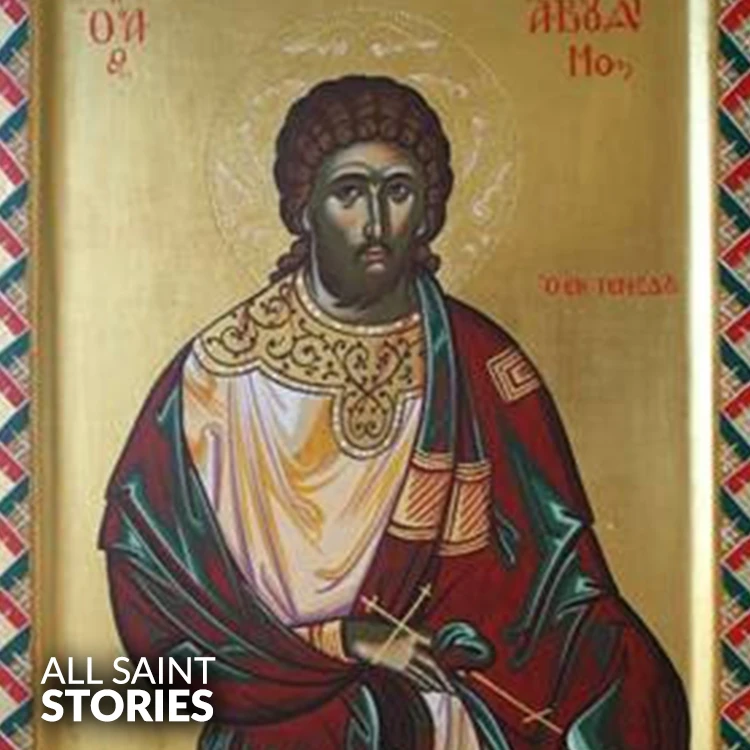Saint Abudimus, faithful servant of God, I ask for your intercession and guidance today. Help me to walk in the light of Christ, strengthen my faith, and lead me on the path of holiness. Pray for me that I may remain steadfast in love and devotion, and may I find peace and strength in your example of steadfast faith. Through Christ our Lord. Amen.
ST. ABUDIMUS
ST. ABUDIMUS

Saint Abudimus, also known as Abudemius of Bozcaada, was a Greek Christian martyr who suffered under the persecution of Emperor Diocletian in 305 AD. He was tortured and eventually killed on the island of Tenedos (modern-day Bozcaada, Turkey) for refusing to eat meat that had been sacrificed to pagan idols. His steadfast faith and refusal to renounce Christianity led to his martyrdom. Both the Roman Catholic Church and the Eastern Orthodox Church recognize him as a saint, and his feast day is observed on July 15. His life is a testimony to unwavering faith and devotion, inspiring many Christians throughout history.
Saint Abudimus was a devoted Greek Christian who lived during the early 4th century AD, a time when Christianity was under severe persecution by the Roman Empire. His faith was put to the ultimate test under the rule of Emperor Diocletian, who initiated one of the most brutal crackdowns on Christians in history. The persecution aimed to force Christians to renounce their faith and worship the Roman gods, often by demanding that they partake in rituals such as eating meat that had been sacrificed to idols.
Abudimus, being a man of deep religious conviction, refused to comply with this demand. His refusal was seen as an act of defiance against the Roman authorities, and as a result, he was arrested and subjected to torture. The specific methods of torture inflicted upon him are not well-documented, but historical accounts of Christian martyrs during this period suggest that he likely endured severe physical suffering, including beatings, imprisonment, and possibly other forms of brutal punishment designed to force a renunciation of faith. However, despite the torment, Abudimus remained steadfast in his beliefs and refused to partake in the idolatrous rituals.
His unwavering commitment to his faith ultimately led to his execution in 305 AD on the island of Tenedos, a small island in the Aegean Sea, known today as Bozcaada, Turkey. The exact details of his death remain uncertain, but like many early Christian martyrs, he may have been beheaded or subjected to another form of capital punishment. His death was not in vain, as it became a source of inspiration for early Christians who faced similar persecution. His story served as a powerful testament to the strength of faith and the willingness to endure suffering for the sake of Christ.
Saint Abudimus’ legacy continued to live on through the veneration of both the Roman Catholic and Eastern Orthodox Churches. His feast day is observed on July 15, a day dedicated to remembering his sacrifice and devotion to Christianity. While little else is known about his life before his martyrdom, his story remains significant in Christian history as an example of steadfast faith in the face of oppression. Even though no major relics or shrines dedicated to him have been widely documented, his name continues to be honored among the ranks of early Christian martyrs.
Throughout Christian history, many believers have drawn inspiration from Saint Abudimus' story, seeing in him a model of courage, perseverance, and spiritual strength. His refusal to compromise his beliefs, even under the threat of death, echoes the sacrifices made by countless other martyrs of the early Church. Today, his feast day serves as a reminder of the challenges faced by early Christians and the price they paid for their faith.
Video Not Found
No images uploaded for this saint yet.
The information on this website is compiled from various trusted sources. While we aim for accuracy, some details may be incomplete or contain discrepancies.
If you notice any errors or have additional information about this saint, please use the form on the left to share your suggestions. Your input helps us improve and maintain reliable content for everyone.
All submissions are reviewed carefully, and your personal details will remain confidential. Thank you for contributing to the accuracy and value of this resource.
Credits & Acknowledgments
- Anudina Visudhar (Malayalam) – Life of Saints for Everyday
by Msgr. Thomas Moothedan, M.A., D.D. - Saint Companions for Each Day
by A. J. M. Mausolfe & J. K. Mausolfe - US Catholic (Faith in Real Life) – Informational articles
- Wikipedia – General reference content and images
- Anastpaul.com – Saint images and reflections
- Pravachaka Sabdam (Malayalam) – Saint-related content and insights
We sincerely thank these authors and platforms for their valuable contributions. If we have unintentionally missed any attribution, please notify us, and we will make the correction promptly.
If you have any suggestion about ST. ABUDIMUS
Your suggestion will help improve the information about this saint. Your details will not be disclosed anywhere.
© 2026 Copyright @ www.allsaintstories.com


 English
English
 Italian
Italian
 French
French
 Spanish
Spanish
 Malayalam
Malayalam
 Russian
Russian
 Korean
Korean
 Sinhala
Sinhala
 Japanese
Japanese
 Arabic
Arabic
 Portuguese
Portuguese
 Bantu
Bantu
 Greek
Greek
 German
German
 Dutch
Dutch
 Filipino
Filipino